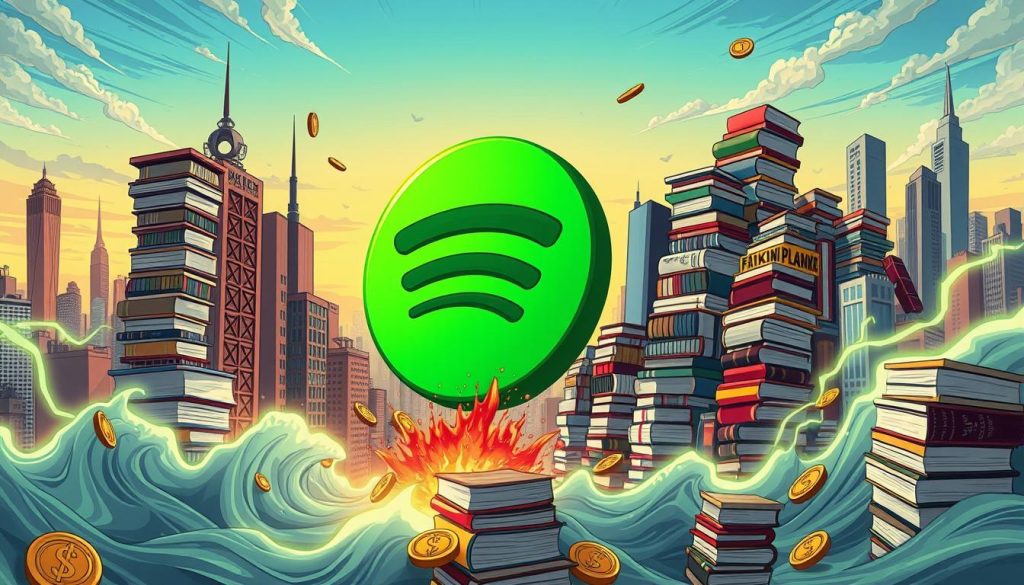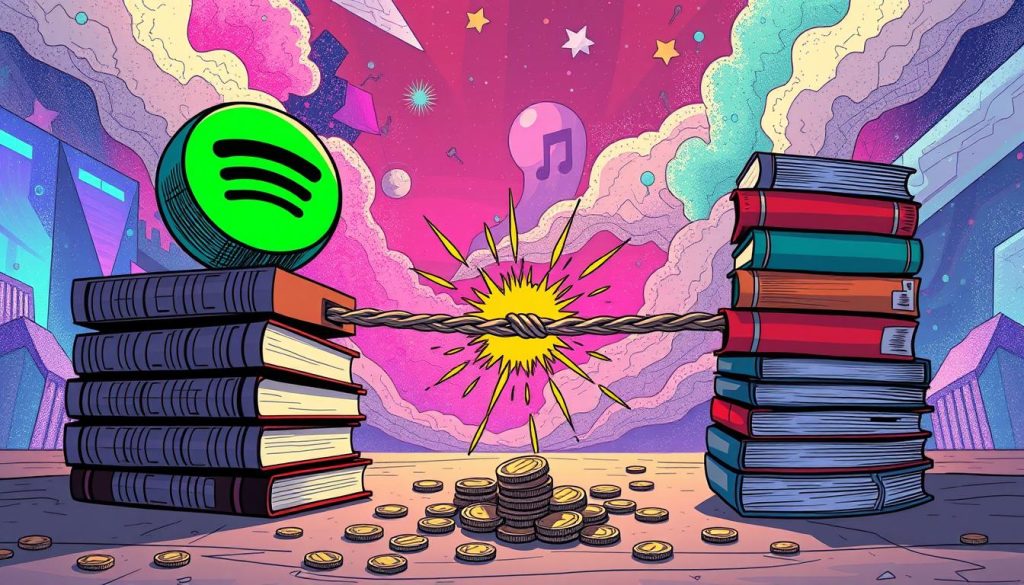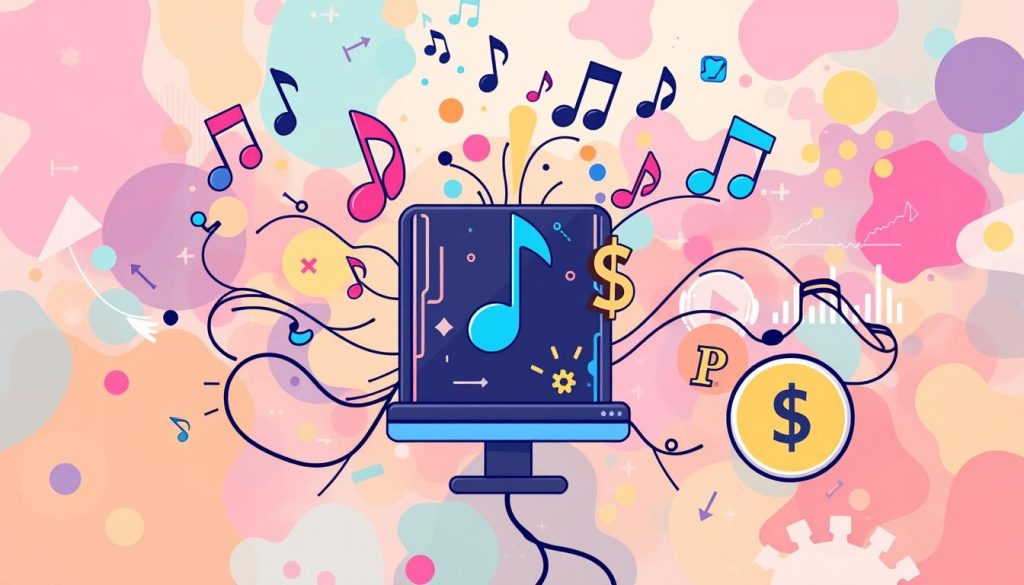Since 2008, Spotify has been criticized for how it pays artists. Unlike sales or downloads, Spotify pays based on how often your songs are played. This has caused big fights with music publishers.
Artists like Taylor Swift and Thom Yorke have pulled their music from Spotify. They’re upset about how little they get paid. This has made things tense between Spotify and music publishers.
Spotify’s free version, with ads, is also a problem. Some big albums have been delayed or taken off because of this. There have also been issues with security, privacy, and even fake artists.
Key Takeaways
- Spotify’s royalty payment model is based on “market share” of an artist’s songs, leading to disputes with music publishers over fair compensation.
- Some major artists have temporarily withdrawn their music from Spotify in protest of the platform’s compensation policies.
- Spotify’s free service tier with advertisements has also been a point of contention, with some album releases being delayed or withdrawn.
- Spotify has faced criticism over security breaches, privacy policy changes, and alleged “pay-for-play” practices.
- The ongoing war between Spotify and music publishers highlights the complexities of the music industry’s transition to a streaming-dominated landscape.
The Contentious Issue of Artist Compensation
The music industry has always struggled with how to pay artists fairly. With the rise of streaming services like Spotify, this problem has grown. Spotify pays artists based on how many streams their songs get, not like selling albums or downloads.
Many artists and producers are unhappy with this system. They say it’s unfair because they make less money as streaming becomes more popular. Musicians like Magnus Uggla and Vulfpeck have spoken out about their low earnings from Spotify.
Spotify’s Royalty Payment Model
Spotify gives about 70% of its money to those who own the rights to the music. Then, artists get paid based on their deals. Some say this system doesn’t pay artists enough to keep making music.
The Recording Industry Association of America says music sales hit $15 billion in 2021. But Spotify lost $39 million that year.
But, the CEO of Merlin Network says Spotify pays labels more now than before. This shows the debate over artist pay in the streaming age is complex and ongoing.
“Whether the disputes between Spotify and the NMPA will escalate to legal action is uncertain.”
Voices of Dissent and Support
The debate on Spotify’s compensation for artists has sparked many views in the music industry. Some independent artists and industry experts have expressed their worries. Yet, others have come to Spotify’s defense.
Patrick Carney of The Black Keys has been vocal in his criticism. He believes “Spotify isn’t fair to artists.” He thinks streaming services still can’t replace the money from traditional record sales. David Byrne of Talking Heads also has spoken out, saying artists will struggle if they rely too much on streaming income.
However, Charles Caldas, the CEO of the Merlin Network, supports Spotify’s compensation model. Caldas points out that Merlin’s labels get more money from Spotify now. He also notes that the revenue per user is at its highest since Spotify started.
These different perspectives from major artists and industry leaders show the ongoing debate. It’s about Spotify’s compensation and its effect on the music industry.
“Spotify isn’t fair to artists,” – Patrick Carney of The Black Keys
The argument over Spotify’s compensation for artists is still a hot topic. People have different perspectives on how it affects the music industry. As the discussion goes on, finding a fair solution is key. It must help both independent artists and major artists thrive.
Spotify and publishers war
Spotify and music publishers are in a big fight. The streaming giant wants a refund for too much money paid to songwriters and publishers last year. This fight started because of a 2018 ruling by the Copyright Royalty Board (CRB) in the US. This ruling raised the royalty rate by 44% or more for 2018 through 2022.
Spotify, along with Amazon, Google, and Pandora, appealed the payment increases in March. Now, Spotify says it paid too much and wants a refund. But it’s not asking for the 2018 money back right away. Instead, it’s offered to wait until the end of 2019, according to Music Business Worldwide.
This fight shows the ongoing problems between Spotify and publishers over money. Spotify wants to get back what it thinks it overpaid. But music publishers and songwriters want to keep the higher royalty rates set by the CRB.
The Ongoing Battle over Royalty Rates
The fight between Spotify and publishers over royalty rate increases and copyright royalty board rulings is a big problem. This fight has gotten worse as streaming service appeals against the higher rates keep going to court.
Music publishers and songwriters say the current system for setting royalties is old and needs to change. They want to update Section 115 of the Copyright Act, which deals with digital music services.
But Spotify and other big tech companies like Amazon, Google, and Pandora want to keep royalty rates low. They even argue that a stream doesn’t need a mechanical license. If they win, songwriters and music publishers could lose a lot of money.
The fight between Spotify and publisher disputes and royalty rate increases shows a big power struggle. As things change, both sides will keep fighting in court. The outcome will shape the future of music.
Evolving Business Practices
Spotify is a big name in music streaming. The company has made changes to address criticism from the music world. One key move is the “artist-in-residence” program. It helps chosen artists work with Spotify and learn more about how it works.
But, Spotify’s moves haven’t been without debate. A story about a Spotify boss calling an artist “entitled” for wanting better pay has upset many. This shows the ongoing issues between Spotify and musicians as the company’s ways of doing business change.
Spotify’s way of paying artists and its dealings with publishers are big points of contention. The platform’s payment system has been seen as unfair by many. This has led to frustration among artists and their supporters, who feel Spotify doesn’t fairly reward music makers.
| Key Spotify Business Practices | Impact on Music Industry |
|---|---|
|
|
As Spotify keeps growing in the streaming world, it must handle these tough issues well. How it works with the music industry will be key to its success. The talks between Spotify and the music world will shape the future of music and how artists are paid online.
“The tensions between Spotify and the music industry reflect the broader challenges of the streaming era, where the balance of power and the distribution of revenue remain hotly contested.”
Conclusion
The fight between Spotify and music publishers over money is still going on. Spotify’s way of paying artists, based on their share of streams, is not liked by many. They say it doesn’t fairly reward creators.
Spotify has tried to help artists, but it’s faced criticism for its actions. For example, it’s asked for money back from some artists. This fight is likely to keep going as the music world changes. Both sides want a bigger piece of the streaming money.
The future of how artists get paid through streaming is unclear. This fight could change the music world a lot. The question is, will streaming still be a good way for artists to make money in the long run?
FAQ
How does Spotify’s royalty payment model work compared to traditional music sales?
Why have some artists criticized Spotify’s compensation model?
How have Spotify’s policies around free service and playlist placements been received?
What have industry figures said about Spotify’s impact on artist compensation?
What is the current dispute between Spotify and music publishers?
How has Spotify responded to the criticism it has faced?
Source Links
- Criticism of Spotify
- DiS002: Discover… The Faux Faux (Faith Vern from PINS) by Drowned in Sound
- NMPA and Spotify: Conflict Over Copyright Infringement
- Inside the Multi-Billion Dollar Battle Royale Over Music-Streaming Royalties
- War propaganda machine silencing voices of truth
- Joe Lauria: No Such Thing as Dissent in the Age of Big Tech
- How Spotify Has Waged War With The Music Industry
- Music Publishers Escalate Their War With Spotify
- NMPA Calls on Congress for Copyright Act Overhaul Amid Spotify Battle Over Bundling
- Streaming Toward Win-Win Negotiation: Spotify Upgrades Its Negotiating Strategy
- Spotify’s Estimated $150M Songwriter Royalty Cuts: Music Industry Reactions (Updating)
- Spotify’s audiobooks bundle referred to FTC
- Spotify vs. Songwriters (again): NMPA says SPOT’s latest move to lower royalty rates is ‘likely to end up in a legal conflict’ – Music Business Worldwide



